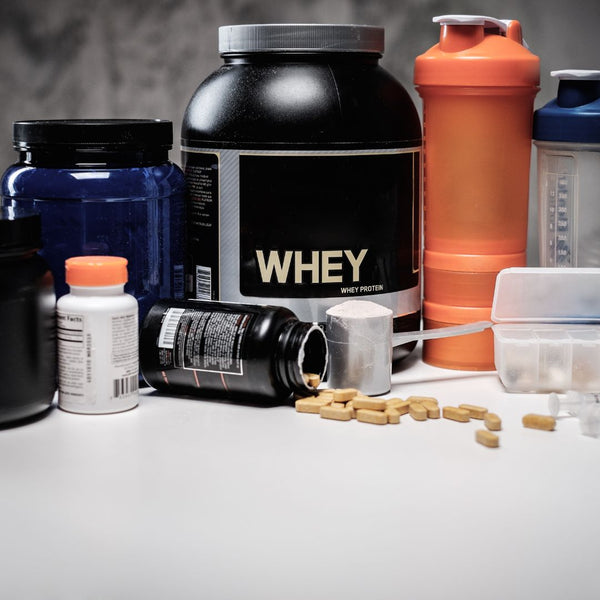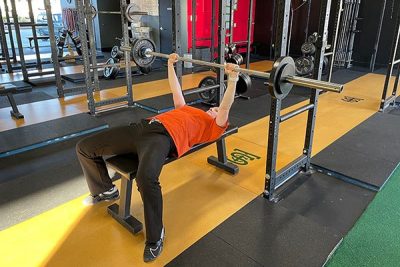
I remember the first time I walked into a supplement store. I had only been working out for a couple of months and had been told that to take my workout to the next level; I needed to start taking supplements. Like most people, I was naive and believed everything the sales rep told me.
I ended up leaving the supplement store with two large bags filled to the brim and my wallet empty. Over the years, I have done my research and learned that if you want to put on mass, you don’t need to refinance your mortgage; instead, you need to ask yourself a couple of questions.
Will this supplement genuinely help me achieve my muscle-building goals? Is it backed by scientific research that will work as advertised? I don’t mean backed by one research article but by substantial evidence from multiple reputable sources.
By asking these questions, you can avoid supplements that could harm your health and underdosed supplements that are a waste of time. I want to make things easy for you, so here are the top three supplements that I recommend to people that are not only backed by scientific research but are also not going to break the bank.
Table of Contents
- Intro
- Whey Protein: The Building Block of Muscle
- Creatine: Enhancing Strength and Performance
- Multivitamin: Filling in the Nutritional Gaps
- Outro
- References
1. Whey Protein: The Building Block of Muscle
It shouldn’t be surprising that the first one on our list is whey protein. It is an incredibly effective supplement for muscle development, repair, and meal replacement. We’re gonna get into some of the nitty-gritty here, so buckle up.
Only nine of the twenty primary amino acids are deemed essential as the building blocks of protein, which means that our bodies cannot make them by themselves. Among these nine essential amino acids are branched-chain amino acids (BCAAs): leucine, isoleucine, and valine.
While not the only factor, they are essential in muscle growth and recovery. Of the three BCAAs, leucine may be the most important. Why, you ask?
That’s because leucine is key in muscle protein synthesis, which enables muscle hypertrophy (growth). According to research done by the American Journal of Clinical Nutrition, the dose of leucine necessary to achieve the maximal stimulation of muscle protein synthesis has been estimated to be 3–4 grams per meal, which, to make it easier to picture, is roughly 25–30 grams of protein per meal.¹
Ideally, you’ll want to opt for whole foods when possible, but sometimes a protein shake is the fastest and easiest way to get protein into your system (gotta stimulate your body’s muscle protein synthesis). For example, a whey protein shake when you wake up makes sense since a lot of people don’t have time in the morning to make a breakfast feast, and it’s a quick way to get your muscle building going.
Protein shakes can also be extremely beneficial for people who have a hard time meeting their nutritional goals. Without getting too deep into it, if you are on the smaller side, it would be easier to achieve your protein intake with whole foods. Someone larger may struggle with getting protein in with just whole foods, so a whey protein shake can make things much easier.
I also recommend whey protein after training because it has a tremendous muscle-building response, and the muscles are basically begging for it. While this can be achieved by using other types of protein, like plant-based protein, whey is far more common, has the most research behind it, and is the fastest to digest, depending on the type of whey protein (big fan of whey isolates).
The question I then get the most is, do you need to use whey protein supplements to see muscle growth? The shortest and easiest way to answer this question is by saying no. You don’t need to, but they can help when used only when necessary.
Based on this research, higher protein intakes of roughly 1.5 g per kg of body weight daily, paired with working out, are required for optimal effects on muscle strength. Researchers also noted that the benefits of increased protein intake on strength and muscle mass seem to stall at 1.5 to 1.6 g per kg of body weight per day, so eating extra protein won’t get you the gains faster. (I wish it did!).² As if muscle gains weren’t enough to entice you to make sure you’re getting sufficient protein in, check out the figure below, which shows what other parts of the body amino acids can have an effect on.
Figure 1: Carbone JW, Pasiakos SM (2019)
Unsure of where to start? Try recording the food you eat throughout the week in an app, journal, etc. This will give you a better idea of whether you’re struggling to reach your protein goals and need a whey supplement or just need to add a Greek yogurt cup to your diet.
2. Creatine: Enhancing Strength and Performance
Of all the supplements available, creatine is among the most widely researched, with creatine monohydrate being the variation with the most science behind it.
Your body naturally produces creatine, which serves various important functions, including energy production, improving exercise performance, and potentially helping combat disease. One study published by the Journal of the American Dietetic Association took 14 healthy and active men randomly assigned to either creatine or a placebo group in a double-blind fashion.
Both groups performed a bench press exercise protocol and a jump squat exercise protocol on three different occasions, separated by six days. The group that took creatine significantly improved peak power output during all sets of jump squats and significantly improved repetitions during all sets of bench presses.
After creatine supplementation, postexercise lactate concentrations were significantly higher after the bench press but not the jump squat. And finally, the results that we truly care about are that the creatine group saw a significant increase in body mass of 1.4 kg.³
So, creatine monohydrate is not only one of the most effective supplements for muscle growth but also one of the most inexpensive. Other forms of creatine are more expensive and claim to have better effects, but they don’t have years of research to back them up.
Unlike many supplements, creatine’s benefits take time to cumulate in your system. This means it can take anywhere from a week to a month to start seeing significant improvements.
While you can get some of your creatine in by eating foods like red meat, salmon, pumpkin seeds, and walnuts, reaching your daily recommended dosage would be difficult. I recommend using a creatine monohydrate supplement and adding 3-5 grams daily for optimal results.? When you take your creatine can also play an important part in how well it works for you.

Figure 2: Naderi A, et al. (2016)
Although, some studies show that larger athletes may need to ingest as much as 5–10 g/day to maintain creatine stores.
If you want to take your gains a step further, check out the chart from a 2017 study that found that taking creatine with carbs and protein improves retention.?

Figure 3: Kreider RB, et al. (2017)
3. Multivitamin: Filling in the Nutritional Gaps
This final supplement was a toss-up between a couple of great options. I think taking a good multivitamin is essential for comprehensive nutritional support because it provides a spectrum of essential vitamins and minerals necessary for overall health and performance.
Let us all be honest with ourselves: Most people don’t eat enough fruits and veggies to justify not taking a multivitamin. While whole foods should be the primary source of essential nutrients, modern lifestyles, and dietary habits often lead to nutritional shortfalls.
Micronutrient deficiencies affect roughly 2 billion people worldwide. An overview of multiple studies shows that about 75% of the US population does not consume the recommended fruit intake, and more than 80% do not consume the recommended vegetable intake.?
Intakes of whole grains are also well below current recommendations for all age groups, and dairy intake is below recommendations for those ages four years and older. Basically, as we get older, we suck at giving our body the proper micronutrients it needs.
Like creatine’s prominent role in muscle-building supplements, scientifically formulated multivitamins offer a convenient and effective way to bridge these potential nutrient gaps and optimize your body’s muscular growth and recovery.
Still, it is worth noting that their impact on muscle growth is indirect, as only certain micronutrients may benefit muscle growth. For example, vitamins such as vitamin D play a pivotal role in muscle function and immune health.
Various studies have shown that vitamin D deficiency is associated with decreased muscle size and strength, particularly of the lower limbs’ large extensor and flexor muscles.?

Figure 4: Gordon PL, et al. (2007)
Minerals like magnesium should also be considered, as they benefit energy metabolism, muscle contraction, tissue repair, and many other body functions.?

Figure 5: Souza ACR, et al. (2023)
Furthermore, evidence suggests that certain micronutrients with antioxidant properties can lower the risk of frailty, adverse functional outcomes, and impaired muscle health.? When selecting a multivitamin, it is essential to choose a product specifically tailored to your needs, such as multivitamins created specifically for women.
The needs of an active individual will vary vastly compared to those of someone over 60 years old and sedentary. So, while multivitamins aren’t nearly as exciting as other supplements for muscle growth, they are the most important, in my opinion.
Check this guide for the best multivitamin options for men in 2024.
Outro:
So there you have it, guys. These are the three best supplements for muscle growth right now, but it is worth noting that if a supplement doesn’t make this list, that doesn’t mean it is terrible.
There are products like fish oil, citrulline malate, Beta-Hydroxy-Beta-Methylbutyrate (HMB), and other muscle growth supplements that will significantly impact your results. But I had to narrow things down to three supplements repeatedly proven safe to consume and beneficial.
If you have any questions about the supplements listed, please feel free to comment below. If you feel like I missed something, feel free to add it to the comments below!
?Now that you have the supplements you should use to build muscle, how about a program to help pack the muscle on.

Prepare to maximize your gains with our exclusive 12-week hypertrophy training program. Choose between a 4 or 5 day training split and gain 2-12 pounds of muscle over 90 days…
References
- Volpi E. Is leucine content in dietary protein the key to muscle preservation in older women? Am J Clin Nutr. 2018 Feb 1;107(2):143-144. doi: 10.1093/ajcn/nqy009. PMID: 29529164; PMCID: PMC6248570.
- Carbone JW, Pasiakos SM. Dietary Protein and Muscle Mass: Translating Science to Application and Health Benefit. Nutrients. 2019 May 22;11(5):1136. doi: 10.3390/nu11051136. PMID: 31121843; PMCID: PMC6566799.
- Volek JS, Kraemer WJ, Bush JA, Boetes M, Incledon T, Clark KL, Lynch JM. Creatine supplementation enhances muscular performance during high-intensity resistance exercise. J Am Diet Assoc. 1997 Jul;97(7):765-70. doi: 10.1016/S0002-8223(97)00189-2. PMID: 9216554.
- Naderi A, de Oliveira EP, Ziegenfuss TN, Willems MT. Timing, Optimal Dose and Intake Duration of Dietary Supplements with Evidence-Based Use in Sports Nutrition. J Exerc Nutrition Biochem. 2016 Dec 31;20(4):1-12. doi: 10.20463/jenb.2016.0031. PMID: 28150472; PMCID: PMC5545206.
- Kreider RB, Kalman DS, Antonio J, Ziegenfuss TN, Wildman R, Collins R, Candow DG, Kleiner SM, Almada AL, Lopez HL. International Society of Sports Nutrition position stand: safety and efficacy of creatine supplementation in exercise, sport, and medicine. J Int Soc Sports Nutr. 2017 Jun 13;14:18. doi: 10.1186/s12970-017-0173-z. PMID: 28615996; PMCID: PMC5469049.
- Drake, Victoria. “Micronutrient Inadequacies in the US Population: An Overview.” Linus Pauling Institute, 13 Apr. 2019, lpi.oregonstate.edu/mic/micronutrient-inadequacies/overview.
- Gordon PL, Sakkas GK, Doyle JW, Shubert T, Johansen KL. Relationship between vitamin D and muscle size and strength in patients on hemodialysis. J Ren Nutr. 2007 Nov;17(6):397-407. doi: 10.1053/j.jrn.2007.06.001. PMID: 17971312; PMCID: PMC2129105.
- Souza ACR, Vasconcelos AR, Dias DD, Komoni G, Name JJ. The Integral Role of Magnesium in Muscle Integrity and Aging: A Comprehensive Review. Nutrients. 2023; 15(24):5127. https://doi.org/10.3390/nu15245127
- van Dijk M, Dijk FJ, Hartog A, van Norren K, Verlaan S, van Helvoort A, Jaspers RT, Luiking Y. Reduced dietary intake of micronutrients with antioxidant properties negatively impacts muscle health in aged mice. J Cachexia Sarcopenia Muscle. 2018 Feb;9(1):146-159. doi: 10.1002/jcsm.12237. Epub 2017 Oct 16. PMID: 29045021; PMCID: PMC5803605.





